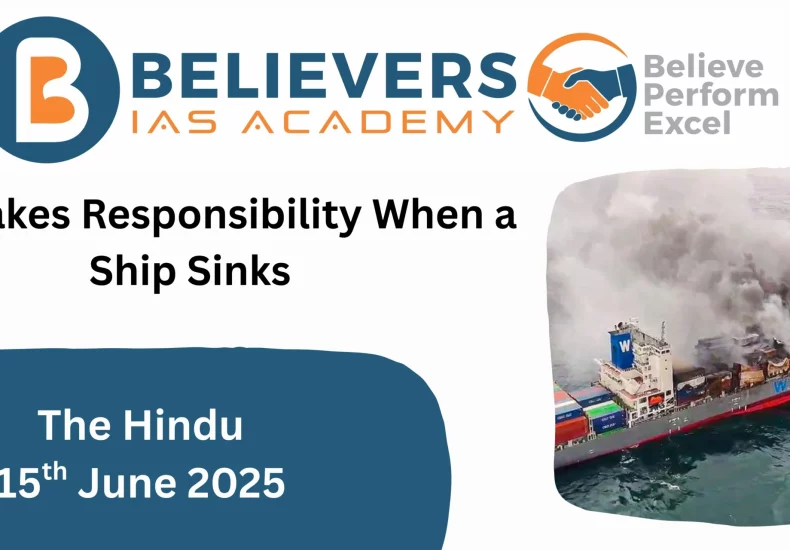
Who Takes Duty When a Ship Sinks?
CONTEXT
In current months, the Kerala coast has witnessed two main maritime accidents:
- The hearth on MV Wan Hai 503, a Singapore-flagged vessel carrying hazardous cargo and over 2,000 tonnes of gasoline.
- The sinking of MSC ELSA 3, a Liberian-flagged container ship transporting hazardous substances like calcium carbide.
These incidents have raised severe environmental, security, and regulatory issues associated to worldwide transport, legal responsibility for environmental injury, and India’s preparedness in dealing with such maritime disasters. The occasions underline gaps in India’s worldwide commitments, particularly regarding hazardous cargo, and produce the main target again to world maritime governance led by the Worldwide Maritime Group (IMO).
Who Regulates International Transport?
🌐 Worldwide Maritime Group (IMO)
- Specialised UN company.
- Oversees world service provider transport norms.
- Enforces conventions on:
- Air pollution management
- Security and accident protocols
- Liabilities and tasks
- IMO norms should be:
- Adopted by member nations (India included).
- Built-in by way of nationwide laws.
India’s Enforcement Authority
- Directorate Common (DG) of Transport ensures compliance.
- Some conventions require Parliamentary approval.
Key Conventions India Has NOT Signed:
- 2004 Ballast Water Conference
- Prevents unfold of invasive aquatic species.
- 2010 Hazardous and Noxious Substances (HNS) Conference
- Offers with legal responsibility and compensation for hazardous substances.
- Related to ELSA 3-type accidents.
Flags of Comfort (FOC)
- Ships typically registered in nations with lax regulation (e.g., Liberia, Marshall Islands).
- Permits lenient inspections and low regulatory oversight.
- Possession and flag nation typically don’t match.
- Complicates enforcement and legal responsibility monitoring.
Legal responsibility for Cargo Loss & Environmental Harm
Who’s Liable?
- Ship Proprietor is responsible for:
- Cargo loss.
- Environmental injury.
Key Authorized Devices:
- Invoice of Lading
- Authorized contract between exporter and shipowner.
- Defines possession, supply phrases, cost course of.
- Safety and Indemnity (P&I) Golf equipment
- Mutual insurance coverage teams protecting:
- Cargo loss
- Environmental injury
- Lack of life
- Mutual insurance coverage teams protecting:
- Indemnity Insurance coverage
- Covers ship physique and equipment injury.
Environmental Legal responsibility:
- No cap on legal responsibility for environmental damages (e.g., oil spills, hazardous cargo).
- Guided by MARPOL Conference (Worldwide Conference for the Prevention of Air pollution from Ships).
- Upholds the Polluter Pays Precept.
- Nationwide legal guidelines could cap or restrict extended compensation claims.
Salvaging a Sunken Ship
Duty:
- Ship proprietor is chargeable for:
- Salvaging the wreck.
- Compensating for injury if salvage is inconceivable.
Key Conference:
- Nairobi Worldwide Conference on the Removing of Wrecks, 2007
- India is a signatory.
- Applies inside India’s EEZ (200 nautical miles).
Why Do Ships Nonetheless Sink?
Causes:
- Environmental components: Tough seas, storms.
- Human errors: Navigation errors, poor cargo administration.
Instance: ELSA 3
- Itemizing (tilting) resulting from uneven weight distribution.
- Containers fell in tough seas, exacerbating the lean, ultimately sinking the ship.
Cellular Sign Accidents:
- Instance: Wakashio (2020) close to Mauritius ran aground whereas making an attempt to sail near shore for cell sign reception.
- Pandemic-related prolonged voyages led to human components overriding navigational security.
SOLAS Conference (Security of Life at Sea)
- Created post-Titanic catastrophe (1912).
- Mandates:
- Enough lifeboat capability on either side to soundly evacuate all individuals even when the ship lists to 1 facet.
- SOLAS is periodically up to date by IMO to enhance:
- Ship design.
- Passenger security.
- IMO incorporates classes from every maritime accident into new or revised security norms.
Conclusion
Maritime accidents, although much less frequent right now resulting from technological developments and worldwide conventions like SOLAS and MARPOL, nonetheless pose vital dangers resulting from human error, regulatory loopholes, and sophisticated possession buildings like Flags of Comfort.
The current circumstances off Kerala’s coast spotlight the necessity for:
-
Stricter nationwide enforcement
-
Better worldwide cooperation
-
India’s ratification of pending conventions just like the HNS and Ballast Water Conventions to strengthen authorized recourse and environmental safety mechanisms.
In the end, these accidents reaffirm the significance of the Polluter Pays Precept, the essential function of IMO-led conventions, and the urgency for India to boost its maritime security, legal responsibility protection, and environmental resilience in an period of accelerating coastal exercise and world commerce.
Leave a Reply